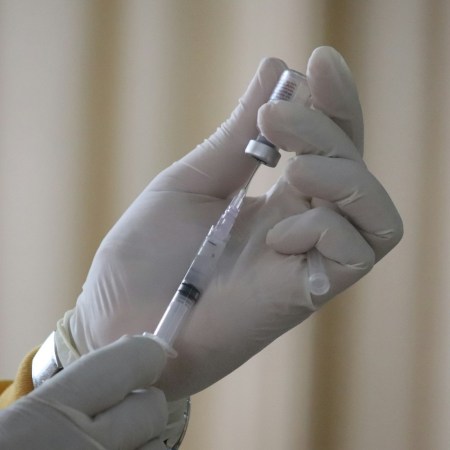In 2011, a study about male birth control was put on hold due to “hormone-related side effects.” Namely: mood swings and depression. Which is interesting, considering that unpleasant changes in mood is one of the most cited side effects by women taking the pill.
The adjective most commonly associated with the development of a male birth control pill is “elusive.” Why? Well, for such a pill to be standardized amongst men, the conventional thinking goes, it needs to be perfect. It should leave no tangible trace on the body or brain.
But that Goldilocks quest is why there was virtually zero progress in male birth control for almost 40 years; as Dr. Christina Chung-Lun Wang of The Lundquist Institute recently wrote for The Conversation, “There has not been a new form of male birth control since the introduction of the “no-scalpel vasectomy” in the 1980s.”
This spring produced a breakthrough — a new male birth control pill was introduced at the American Chemical Society, alongside some compelling research. Clinical trials on male mice displayed 99% effectiveness at preventing pregnancy. And (crucially!) the pill is billed as “non-hormonal.”
It’s commendable that endocrinologists have spent years trying to avoid tampering with testosterone (in the case of one male contraceptive gel, for instance, researchers worked to “preserve men’s low-pitched voices”), but compared to the inevitable collateral of female birth control, it all feels mildly ridiculous.
Consider: 98% of sexually active women use birth control at some point in time. So, basically all of them. The pill affects different women in different ways, but the slate of side effects is robust — soreness, nausea, headaches, the aforementioned changes in mood. This arrangement has been the norm for half a century now, which is surely part of the reason men take it for granted, but in a post-Dobbs world, we need to address this inequity.
Some good news? Many men already are. It might be time for the world of medicine to look past its own studies and go out and read some surveys, which suggest that men are receptive to forms of male birth control beyond condoms and the ole pull-out method. Even before the Supreme Court decision, 70% of men between the ages of 18 and 44 indicated that they would be interested in new male contraception. And since it, there has been a two-and-a-half fold increase in vasectomy interest.
Ultimately, widespread distribution of a male birth control pill is contingent on the willingness of a pharmaceutical company to invest millions of dollars developing the drug. But hopefully, in due time, the implicit bias that has stymied such projects (RE: men will never take this), will start fade.
There are still men who have no interest in pulling their weight, obviously. But surprisingly, the majority of men recognize that we’ve benefited from an unfair deal for too long. And at a time when reproductive rights are under threat like never before, the very least we can do is give up the quest for perfection.
The Charge will help you move better, think clearer and stay in the game longer. Subscribe to our wellness newsletter today.


















